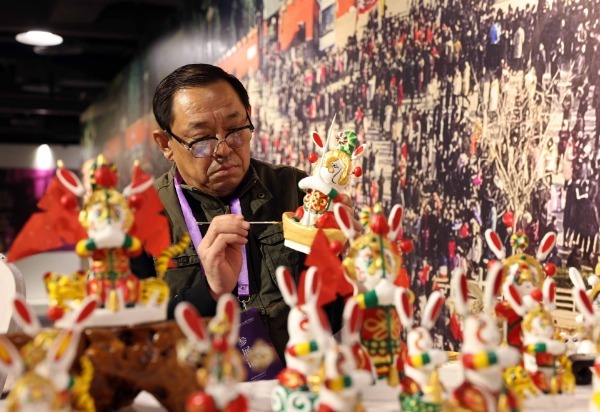Preserving intangible cultural heritage contributes to poverty alleviation
Xinhua | Updated: 2020-11-05 15:58

Silversmith Pan Shixue has gained much popularity after he was livestreamed forging silver ornaments at an intangible cultural heritage expo in Jinan, capital of East China's Shandong province.
"Back in my hometown in southwest China's Guizhou Province, the revived traditional craftsmanship has helped many of my fellow villagers shake off poverty," Pan said.
At the Sixth China Intangible Cultural Heritage Expo that lasted from Oct 23 to 27, a total of 84 intangible heritage items from across the country were displayed.
The event jointly organized by the Ministry of Culture and Tourism and the Shandong provincial government promoted 46 intangible heritage workshops and programs from poverty-stricken areas.
Pan said the Miao ethnic silversmith technique was listed as one of the first batches of China's national-level intangible cultural heritage in 2006. He went to inherit the skill in 2017 under a government-sponsored intangible heritage preservation program.
He has since helped a dozen impoverished families in his hometown of Maliao Village, Guizhou, to assimilate the craftsmanship. His own silver workshop now has an annual sales volume of more than 200,000 yuan (about $30,000).
The initiative of promoting intangible cultural heritage workshops has been jointly carried out by the State Council Leading Group Office of Poverty Alleviation and Development and the Ministry of Culture and Tourism since 2018. The efforts are aimed at reviving the heritages while alleviating poverty.
Shi Jia, an inheritor of Miao ethnic embroidery from central China's Hunan Province, said her workshop trained more than 1,000 women of the Miao ethnic group. Among them, 486 later signed up to work for her company.
"Many of them are from the 131 local impoverished families, and they can work at home. An embroider can earn 1,000-2,000 yuan a month, adding to their family income," said Shi.
Data from the Hunan Provincial Department of Culture and Tourism show that as of the first half of 2020, 152 intangible cultural heritage workshops have been set up in 51 poverty-stricken counties in Hunan.
Such workshops managed to draw 129,000 people to learn the skills, creating work-at-home opportunities for people from 72,000 impoverished households and helping 68,000 people rid of poverty.
Li Donglian, the fifth-generation inheritor of the Zhuang ethnic brocade technique in south China's Guangxi Zhuang Autonomous Region, said a shawl with the brocade sells for as much as 4,800 yuan, which costs a weaver three months of hard work.
Li has developed a variety of Zhuang brocade products, such as scarfs, shawls and cushions. Most of the weavers contracted by Li's workshop are rural women. They can each earn 10,000 yuan a year from weaving at home. The job is generally welcomed as it does not prevent the women from taking care of their families or doing farm work.
As of October this year, more than 2,000 intangible cultural heritage workshops have been set up as part of poverty alleviation efforts, providing training to some 180,000 people, data from China's Ministry of Culture and Tourism showed.
These workshops generated employment for 500,000 people and lifted more than 200,000 poor households out of poverty.
























